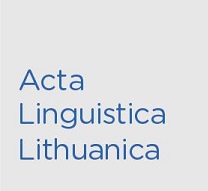Tarmės įtaka Mariaus Katiliškio raštų kalbai
Influence of Dialect on the Language of Marius Katiliškis’ Works
Author(s): Janina Švambarytė-ValužienėSubject(s): Geography, Regional studies, Studies of Literature, Recent History (1900 till today), Phonetics / Phonology, Lexis, Lithuanian Literature
Published by: Lietuvių Kalbos Institutas
Keywords: West Highlanders Šiauliai subdialect; dialectal vocabulary; proverb; generic language; dialectal speech expression;
Summary/Abstract: The article describes linguistic views of writer Marius Katiliškis (real name is Albinas Vaitkus, born on 15 September 1914 in Gruzdžiai, Šiauliai district; died on 17 December 1980 in Lemont, a suburb of Chicago), who comes from Northern Lithuania, Žagarė district, discusses the lexis of Šiauliai sub-dialect of the Western Aukštaitian used in Katiliškis’ works and dialect speech patterns that the writer is known for. The article is compiled with reference to the material of the manuscript of the Glossary of Marius Katiliškis Works (abbreviated as KtŽ), compiled by the author of the article. KtŽ lexis is compiled from the novels Miškais ateina ruduo (1969), Užuovėja (1990), Išėjusiems negrįžti (1990) and a collection of short stories Seno kareivio sugrįžimas (2003). Katiliškis had a good command of Žagarė speech: he had heard quite a few stories told in it, collected and noted individual words, their forms and language expressions. Dialect lexis abundant in Katiliškis’ writings indicates that the writer acted as a dialect user, i.e., created words, formed collocations not included into any dictionaries, used various nuances of word meaning. Words used or created by Katiliškis are affective, noticed by the reader as new, emotional, finally interesting in the way of phonic and semantic meaning. In Katiliškis’ writings the story is relayed by using simple and extended sentences or thoughts that are divided into short sentence components. It seems that the writer wishes to halt the reader for a moment and to emphasise every collocation or phrase. Usually, this kind of fragmented sentence also conceals an emotion expression. Katiliškis’ writings, as indicated in the article, are written in local dialect, i.e., dialect language used in 20th century. Up till this day, the development of standard language requires a more in-debt study by linguists focused on various areas of research, and Katiliškis’ writings are texts on which such an investigation should be grounded.
Journal: Acta Linguistica Lithuanica
- Issue Year: 2017
- Issue No: 76
- Page Range: 155-172
- Page Count: 18
- Language: Lithuanian

